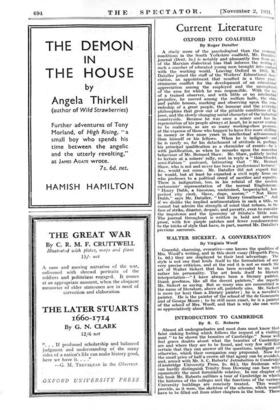Current Literature
OXFORD INTO COALFIELD
By Roger Dataller
A study more of the psychological than the economic conditions in the South Yorkshire coalfield, Mr. Dataliefc journal (Dent, 5s.) is notably and -pleasantly free from en,. of the Marxian dialectical bias that informs the writing of such a number of educated young. men brought into contact with the working world. Leaving Oxford in 1931, mc. Dataller joined the staff of the Workers' Educational Asa°. ciation, an appointment that resulted in a three years, strenuous conflict for the development of an educational appreciation among the employed and the unemployed of the area for which he was responsible. With the eye of a trained observer, and with little or no intellectual prejudice, he moved among the welfare halls, the clubs and public houses, marking and- observing upon the corn. radeship of a great people, the humour and the everyday philosophies that grow out of the pitiable conditions of the poor, and the slowly changing social character of the industrial countryside. Because he was once a miner and has the regeneration 9f his people always, at heart, he is never content to be malicious, as are so many working-class pioneers, at the expense of those who happen to have five more shillings in money or five more years in intellectual advancement than himself or his fellows. When he is indignant—and he is rarefy so, for his detachment of attitude is, perhaps, his principal. qualification as a chronicler of events—he is with justification, as when lie remarks upon the conceited behaviour of Mr. Bernard Shaw. Mr. Shaw, politely invited to lecture at a miners' ially, sent in -reply a thin-blooded, semi-Fabian " postcard, intimating that " Mr. Bernard Shaw, who is not and never has been a professional lecturer," &e., would not come. Mr. Dataller did not expect that he would, but at least he -expected a civil reply from one who professes to a political creed of sacrifice and equality. There is indignation, too, in his refutal of the modern cartoonists' representation of the normal Englishman: " Henry Dubb, a timorous, undersized, bespectacled, hen-
pecked city clerk. Slave, dupe, moron." Not Henry Dubb," says Mr. Dataller, " but Henry Greatheart." And if we dislike the implied sentimentalism in such a title, we cannot but admire the strength of mind that refuses, in the face of strike, disaster, despair, and poverty, even to consider the impotence and the ignominy of Strube's little man. The journal throughout is written in bold and arresting prose, with few purple patches and fewer condescensions to the tricks of style that have, in part, marred lair. Datalkis previous successes.














































 Previous page
Previous page